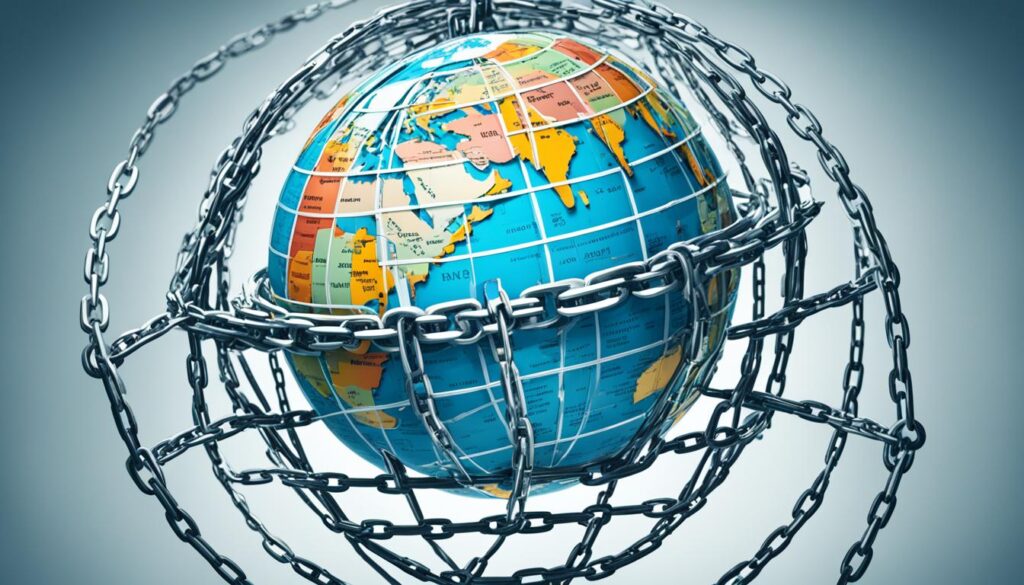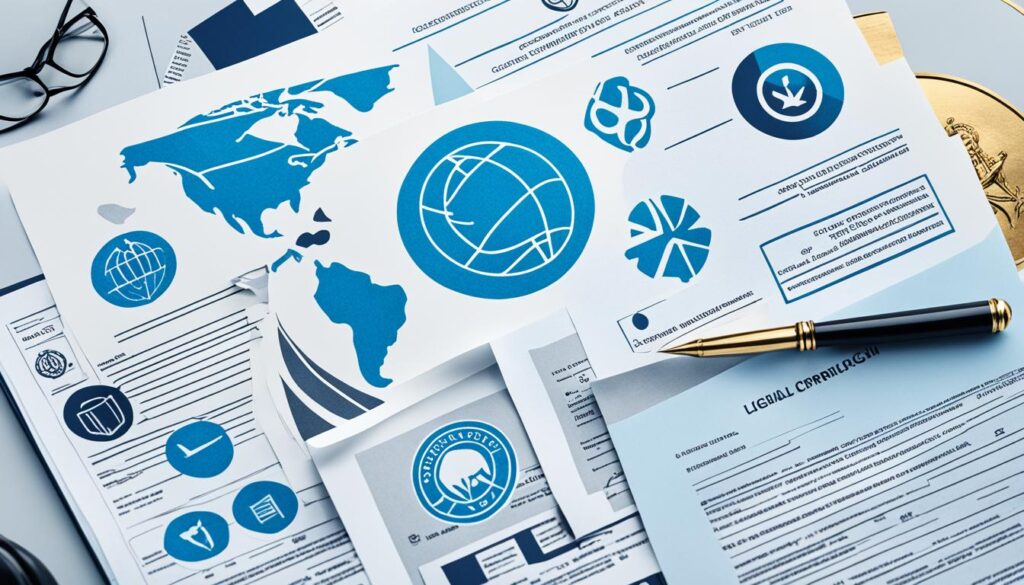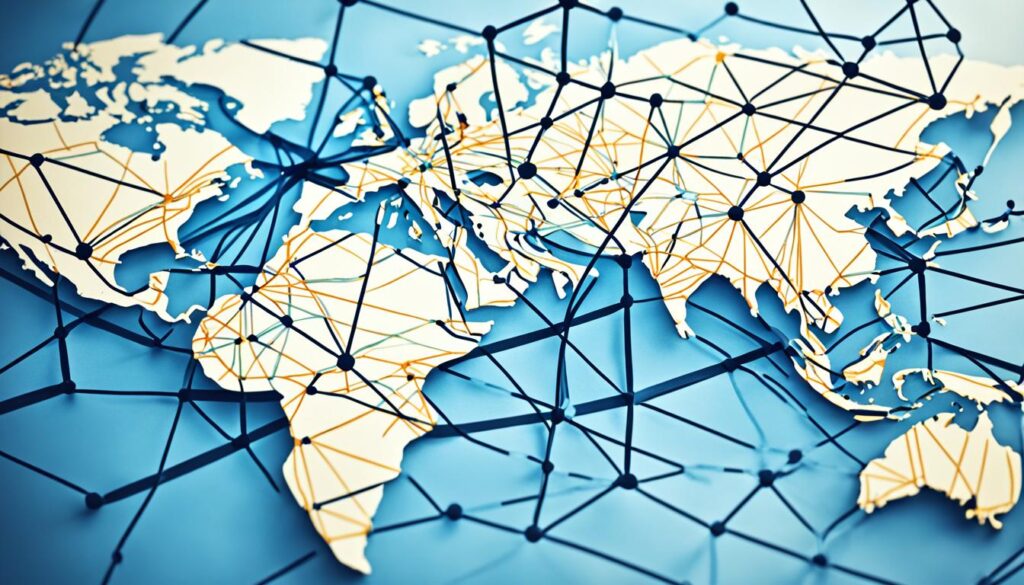Is the Internet really a place without borders, or are we seeing a new era of digital divisions? This question is key to understanding our online world. Jurisdictional challenges and legal issues are changing how we use the digital space.
Today, our online presence goes way beyond where we live. But, this global reach means we face many legal hurdles. Almost 90% of employers, clients, and partners look up information online1. This shows how important managing our online reputation is.
The Internet’s global nature brings unique legal challenges. Law firms now help people and businesses deal with these issues. They handle everything from social media disputes to how we show up in search results.
Once we put content online, it can affect us for a long time. More than 80% of people have seen a bad review or online info hurt their career or business chances1. This shows we need to manage our online reputation well and get legal help.
We’ll look into how the Internet’s global nature meets local laws, making online rules tricky. Join us as we dive into the complex world of online jurisdiction and its big impact on our lives.
Key Takeaways
- The Internet’s global nature creates complex jurisdictional challenges
- Online reputation management is crucial in today’s digital landscape
- Legal implications of online activities extend across borders
- Varying legal frameworks complicate global online presence
- Proactive strategies and legal support are essential for managing online reputation
- Local territorialism and global economies create a fragmented online landscape
Understanding the Global Nature of the Internet
The Internet has changed our world, making a global online space that goes beyond borders. Today, our online lives stretch far beyond where we live. Search engines and social media connect us to this vast world.
The 2010s saw a big push towards digital living, especially with the COVID-19 pandemic in 20202. This crisis made us rely more on the digital world. It changed how we act and how markets work2.
Since 2012, the Internet & Jurisdiction network has brought together over 100 key groups worldwide3. They work on creating ways for countries to work together online. This helps keep the Internet a global space3.
The Internet challenges traditional ways of thinking about borders, making us look for new solutions for online issues.
Experts like Teresa Scassa and Robert J. Currie have looked into how the Internet affects old rules4. They got funding from the Social Sciences and Humanities Research Council of Canada. They suggest new ideas to handle the Internet’s global challenges4.
| Aspect | Traditional | Internet Era |
|---|---|---|
| Borders | Clearly defined | Blurred |
| Jurisdiction | Territorial | Transnational |
| Regulation | National laws | Global cooperation needed |
Understanding the Internet’s global nature and its legal sides is key. The international journal world is studying these topics. They help us grasp the Internet’s vast, borderless world.
The Evolution of Internet Regulation
The internet has changed a lot since its early days. We now see it as a space that can be controlled, not just free5. This change has shaped how we use and interact online.
Legal rules are key to managing online platforms and actions. In January 2021, Julia Hörnle’s book “Internet Jurisdiction” talked about these issues6. It showed the need for strong public policies to handle the internet’s challenges.
Policymakers must balance freedom and control online. They need to deal with big issues to keep the internet safe and fair. This includes stopping cyberbullying and online harassment, which can hurt people’s feelings, jobs, and even their bodies7.
The internet is not just free; technology helps decide what we can and can’t do online.
Experts suggest a mix of ways to solve these problems. This mix includes teaching people more, offering ways to defend your reputation, hotlines for reporting issues, and rules for companies7. The aim is to make the internet a better place for everyone.
| Aspect | Old Perspective | New Perspective |
|---|---|---|
| Internet Nature | Unregulatable space | Subject to control |
| Legal Approach | Limited application | Comprehensive frameworks |
| Policy Focus | Freedom-centric | Balance of freedom and security |
| User Protection | Minimal safeguards | Multi-modal protection strategies |
As the internet keeps changing, so will its rules. The challenge is to make laws that protect users but still keep the internet open.
Jurisdictional Challenges in Reputation Management
The internet’s global reach makes managing reputations tricky. Online content doesn’t respect borders, making it hard to use old rules for reputation issues. This makes it tough to protect and manage online reputations in different legal areas.
In the U.S., Section 230 of the Communications Decency Act protects online platforms from being blamed for what users post. The EU’s Digital Services Act wants to make the internet safer and stop harmful content8. These laws show the tricky legal issues in managing reputations.

Defamation laws change from country to country, affecting how we deal with bad reviews and online attacks. In England and Ireland, you need proof of ‘serious harm’ for defamation cases. In Singapore, protecting someone’s reputation is more important than free speech8. These differences make it hard for global businesses to manage their brands.
What people say online can affect jobs, trust in a business, and personal relationships. Bad online content can cause customers to leave, sales to drop, and harm a brand’s image9. To tackle these issues, lawyers in reputation management try to remove bad content and spread good info across different places.
| Jurisdiction | Key Legal Aspect | Impact on Reputation Management |
|---|---|---|
| United States | Section 230 immunity | Platforms not liable for user content |
| European Union | Digital Services Act | Stricter content regulation |
| England/Ireland | ‘Serious harm’ requirement | Higher threshold for defamation claims |
| Singapore | Prioritized individual reputation | Stronger protection against defamation |
Handling these legal issues needs a deep understanding of laws from around the world and how they affect managing reputations. As online reputations become more important for both businesses and people, knowing these laws is key for good reputation management.
International Copyright Laws in the Digital Age
The digital age has changed how we make and share creative works, pushing copyright laws to their limits. In 1971, the Berne Convention set the standard for protecting creative works worldwide10. Now, it has over 170 countries on board, showing how widely these laws are followed11.
Big companies have a hard time protecting their creative works abroad. They spend a lot to keep their ideas safe in other countries because it’s tough11. The Indian Copyright Act of 1957 got updated in 2012 to cover things like computer software and databases12.

Dealing with digital piracy is a big problem. To fight it, companies use Digital Rights Management (DRM) to control how people access and share digital stuff1112. The WIPO Copyright Treaty helps tackle these digital issues10.
“In the digital age, protecting intellectual property is crucial for innovation and creativity.”
The U.S. Copyright Act is different from global standards in some ways. It has special rules for moral rights and fair use, which are broader than what’s seen internationally10.
| Challenge | Solution |
|---|---|
| Digital Piracy | Digital Rights Management (DRM) |
| Jurisdictional Differences | International Treaties |
| Technological Innovation | Regular Law Updates |
As we move forward, finding the right balance between innovation and protection is crucial. The digital era calls for copyright laws that are flexible and fair, protecting creative works globally.
Choice of Law in Online Disputes

The digital age has made applying international law in online disputes tricky. We now face challenges in figuring out which laws apply across borders. The Berne Convention, a key part of international copyright law, has a specific rule in Article 5.2 about choosing the law.
This rule means the law of the country where protection is claimed applies. But, it doesn’t solve conflicts between foreign copyright laws and the laws of the place where the dispute happens.
In cloud computing, legal issues have popped up in areas like privacy, intellectual property, and antitrust13. Courts are finding it hard to keep up with new tech, leaving a gap between innovation and laws13.
Online disputes in fields like energy and infrastructure are also complex. About 70% of big projects in these areas have laws from multiple places, making it tough to handle disputes across borders14.
“The continuing scientific development of cloud computing is progressing faster than its legal counterpart.”
Legal experts must think about several things when dealing with online disputes. Here are some key points to consider:
| Factor | Consideration |
|---|---|
| Jurisdiction | Determine which country’s laws apply |
| Nature of Dispute | Assess if it’s copyright, privacy, or antitrust-related |
| International Treaties | Consider applicable conventions (e.g., Berne Convention) |
| Technology Involved | Evaluate if cloud computing or other tech is central to the dispute |
| Parties Involved | Identify if multiple jurisdictions are represented |
As we navigate these complex issues, staying updated on new trends is key. The mix of technology and law keeps changing, requiring legal pros to be flexible and innovative.
Emerging Trends in Internet Jurisdiction
The digital world is changing fast, bringing new challenges to how we handle internet laws. We’re seeing big changes in how legal systems deal with online issues across borders. For example, online reputation attacks and defamation cases in e-commerce have risen by 25% in the last five years15.
Legal trends are changing to meet these new challenges. Now, 60% of tech industry cases need legal help that crosses borders15. This shows how online platforms are getting more complex and global. The EU has made a big move, saying that personal data made in its area is under European law16.

Cybercrime is pushing legal limits too. Law enforcement is facing problems like higher costs, harder investigations, and the ease of staying anonymous online16. These issues are changing how we manage the internet.
In Latin America and the Caribbean, there’s a big push for new laws. Fake news, sharing of explicit content without consent, and cybersecurity issues are driving this change17. The region is also aiming for a Digital Single Market, like the EU’s plan to make online shopping and data protection easier17.
| Trend | Impact |
|---|---|
| Cross-border legal expertise | 60% of tech industry cases |
| Online reputation attacks | 25% increase in e-commerce |
| Data protection regulations | 50% of LAC countries have specific laws |
These trends show we need a unified way to handle internet laws. As online platforms connect us more, legal systems must change to ensure fair and effective rules in our global world.
Conclusion
As we conclude our look at jurisdictional challenges and legal issues online, it’s clear the digital age has changed how we handle reputation and legal matters. The internet’s global reach has made navigating legal issues complex for businesses and individuals.
Our exploration showed how crucial online reputation management is. With 91% of consumers reading online reviews and 84% trusting them as much as personal advice, digital reputation greatly affects business success18. Also, companies with strong reputations are 2.5 times more valuable than their competitors18.
We’ve seen how laws and dispute resolution methods differ around the world. Some countries encourage mediation with penalties, while others are more open19. This shows the importance of knowing local laws and using arbitration clauses in contracts to avoid unwanted legal issues19.
In the digital age, it’s key for businesses to focus on managing their online reputation and keep up with changing laws. This way, they can handle the complexities of the global online world, protect their brand, and succeed in a connected world.
FAQ
What are some of the key jurisdictional challenges posed by the global online landscape?
How has the evolution of internet regulation impacted the online landscape?
What are some of the challenges in managing online reputations across borders?
How do international copyright laws function in the digital age?
What is the significance of the Berne Convention’s choice of law rule?
What are some emerging trends in internet jurisdiction?
Source Links
- The Role of Legal Support in Resolving Online Reputation Issues – https://www.linkedin.com/pulse/role-legal-support-resolving-online-reputation-issues-devin-miller-s6spc
- Challenges for Corporate Reputation—Online Reputation Management in Times of Global Pandemic – https://www.mdpi.com/1911-8074/15/6/250
- PDF – https://www.internetjurisdiction.net/uploads/pdfs/Papers/IJ-Paper-Jurisdiction-on-the-Internet.pdf
- New First Principles? Assessing the Internet’s Challenges to Jurisdiction – https://digitalcommons.schulichlaw.dal.ca/cgi/viewcontent.cgi?article=2318&context=scholarly_works
- Carving up the Internet: Jurisdiction, Legal Orders, and the Private/Public International Law Interface – https://academic.oup.com/ejil/article/19/4/799/349335
- The Jurisdictional Challenge Answered—Enforcement through Gatekeepers on the Internet | Internet Jurisdiction Law and Practice – https://academic.oup.com/book/39409/chapter/339107910
- Repairing Online Reputation: A New Multi-Modal Regulatory Approach – https://ideaexchange.uakron.edu/cgi/viewcontent.cgi?article=1144&context=ua_law_publications
- Defamation & Reputation Management: Overview – https://www.lexology.com/library/detail.aspx?g=26557fe3-2eab-430f-8c4d-6886f5d019bd
- Reputation Management Attorneys: Safeguarding Your Online Image and Brand – Spitz Solutions – https://spitzsolutions.com/reputation-management-attorneys-safeguarding-your-online-image-and-brand/
- International Copyright Law – UW Copyright Resource – https://copyrightresource.uw.edu/copyright-law/international-copyright-law/
- International Copyright Laws: Implications for Global Corporations – Michael Edwards | Commercial Corporate Solicitor – https://michaeledwards.uk/international-copyright-laws-implications-for-global-corporations/
- Intellectual Property Rights in the Digital Age: Challenges and Solutions in the 21st Century – – https://unfoldlaw.in/intellectual-property-rights-in-digital-age/
- Personal Jurisdiction and Choice of Law in the Cloud – https://digitalcommons.law.umaryland.edu/context/mlr/article/3605/viewcontent/73_1_313_personal.pdf
- Dispute Resolution and Conflict of Laws Risks – https://www.lexology.com/library/detail.aspx?g=f8890334-faad-4223-85a2-976fe65864e2
- The Legal Implications of Online Reputation Attacks and Defamation – https://www.linkedin.com/pulse/legal-implications-online-reputation-attacks-devin-miller-dl0mc
- Jurisdictional Issue – an overview – https://www.sciencedirect.com/topics/computer-science/jurisdictional-issue
- Key findings of the Internet & Jurisdiction and ECLAC: Regional Status Report 2020 – https://repositorio.cepal.org/bitstream/handle/11362/45732/4/S2000402_en.pdf
- Ultimate FAQ:Online Reputation Management, What, How, Why, When – FasterCapital – https://fastercapital.com/content/Ultimate-FAQ-Online-Reputation-Management–What–How–Why–When.html
- The In-House Lawyer | Reputation management and disputes: avoiding an avalanche of scrutiny – https://www.inhouselawyer.co.uk/legal-briefing/reputation-management-and-disputes-avoiding-an-avalanche-of-scrutiny/

